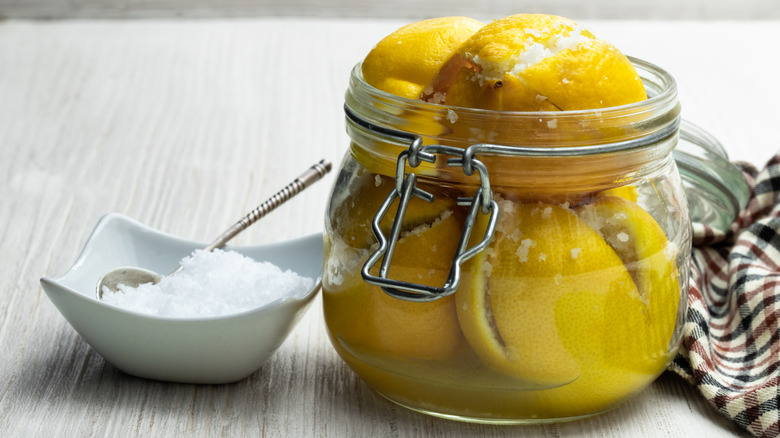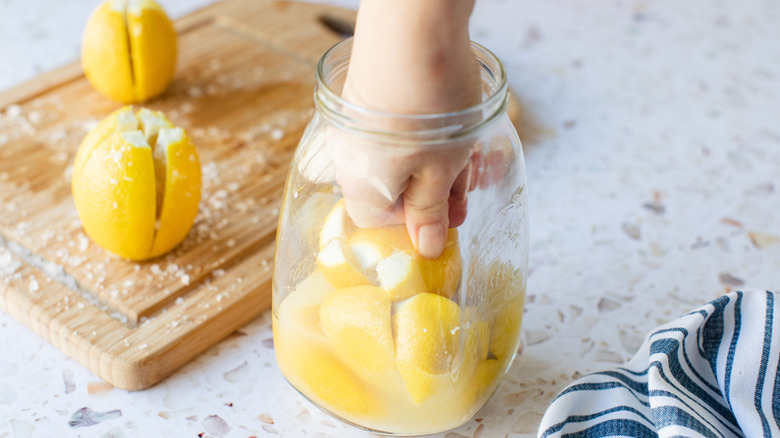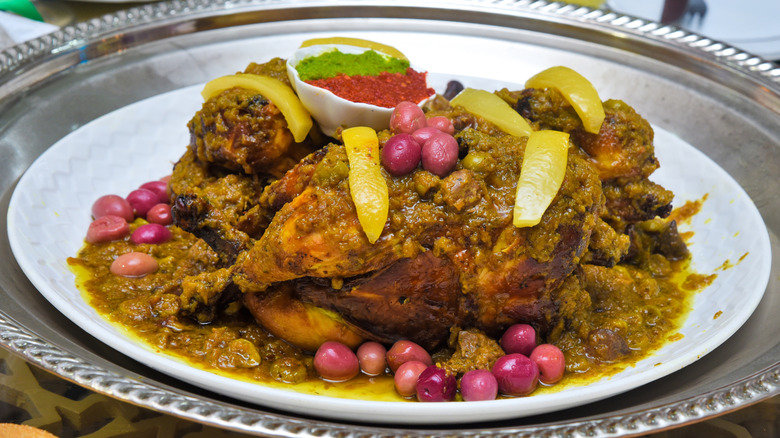Next Time You Have Too Many Lemons, Try This Moroccan-Style Of Preservation
Moroccan lemon preservation is an ancient technique that involves salt-packing fresh lemons in their own juice. After a month of curing, these lemons are used as a staple in Moroccan cuisine, such as in recipes for tagines, stews, and salads. While they're wildly popular in Morocco, preserved lemons aren't unique to the region. Known as lemon pickles, pickled lemons, and country lemons, preserved lemons have been treasured for centuries in many cultures as a condiment, health food, and prized cooking ingredient.
Salt packing lemons started as a way to extend their use beyond the growing season in places like Morocco and the Middle East. But the practice traveled along with lemons as they were exported around the world. Pickling lemons became popular in European cookbooks in the 19th century to preserve the exotic fruit so far from where it was grown.
Moroccan preserved lemons are very easy to make and require only a few ingredients, but they do take at least a month to cure. Once they're ready, they'll last up to a year in the fridge. The preservation method mellows out the sour zest of the lemon rinds and adds a salty flavor to the mix, along with a pickled taste that comes from the fermentation. They can be used in baking and cooking, as a unique condiment on the dinner table, and in cocktails. Pickled lemons are even used in Ayurvedic cooking to support health and wellness.
How do you make Moroccan preserved lemons?
Traditionally, preserved lemons only require two ingredients: lemons and coarse kosher salt, all packed inside a glass jar. The type of lemons and salt you use will have an impact on your final product. If you have access, the best lemons to use are the fragrant doqq and boussera varieties, found only in Morocco. Eureka and Meyer lemons are great alternatives, but any kind will work for the project. Depending on the size of the lemons, you'll either cut a few small slices into the rind or quarter them before preservation. If you're cutting the lemons into quarters, keep the rind intact to maintain the structure of the fruit.
Coarse salt is the key to preserved lemons, and the trick is to pack it into every nook and crevice. Salt-packing dates back to ancient civilizations, and is one of the oldest food preservation techniques in the world. It works on several fronts by removing water, microbes, and bacteria from whatever you are preserving. Coarse salt works best because it doesn't contain anti-caking agents or other additives. Once you've packed the lemons with salt and stuffed them into a jar, cover them with lemon juice and let them sit on the counter for four to five weeks. Add black peppercorns for a spicy kick or create other takes on Moroccan preserved lemons by adding cinnamon or rosemary.
How do you use Moroccan preserved lemons?
Moroccan preserved lemons are featured in all kinds of North African and Middle Eastern recipes. They're often combined with olives, feta cheese, lamb, braised chicken, cabbage, artichokes, and other vegetables in traditional Moroccan tagine dishes, which consist of ingredients slow-cooked in a clay pot (also called a tagine).
Preserved lemons can add a zesty twist to a simple lettuce salad, or you can use them to make your Mediterranean style chicken salad even better. They pair well with all kinds of meat, particularly with lamb, fish, and other seafood. Meanwhile, some home chefs process their preserved lemons into a paste and use it to season potato and meat dishes, braises, soups, and salad dressings. Others take extra care when preparing their preserved lemons so they can use them as host or holiday gifts.
Set out a dish of pickled lemons in the morning as a unique way to flavor cottage cheese, yogurt, or other creamy dishes. Top a fresh batch of fluffy lemon ricotta pancakes with Moroccan preserved lemons to intensify the lemon flavor. You can also use preserved lemons to make a zesty hummus, or add them to your baking to infuse custard, cheesecake, and lemon cookies with a bright, intense flavor.


